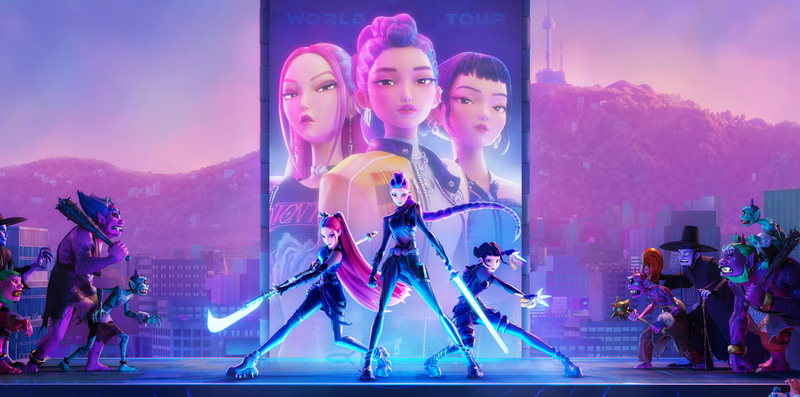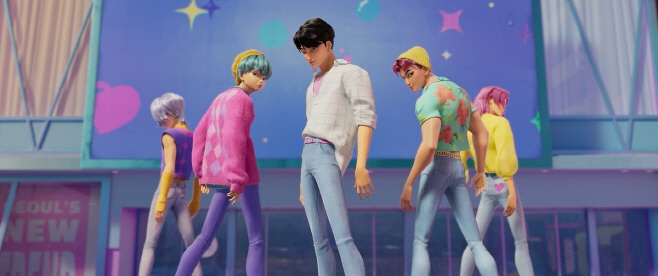K-Culture Backed by American Capital: ‘K-Pop Demon Hunters’ Hits No. 1 on Netflix in 41 Countries
Input
Modified
Directed by Korean-Canadian Maggie Kang Faithfully Recreates K-Pop, Blended with Korean Culture Hits No. 1 Worldwide, Sparks Outcry in China: ‘Korea Stole from Us Again

The global entertainment landscape is once again witnessing the unstoppable rise of Korean culture, this time through an unlikely medium—an American-produced animated film about K-pop idols battling demons. K-Pop Demon Hunters is not just a clever fusion of music, fantasy, and action; it is a cultural phenomenon that reflects how K-culture has become one of the most lucrative and influential forces in global media. Since its release, the film has captured the imagination of audiences worldwide, reaching the No. 1 spot on Netflix in 41 countries. But with fame comes controversy. As the world celebrates this vibrant depiction of Korea, some Chinese netizens are accusing it of cultural theft, exposing the persistent tensions that often accompany the globalization of Korean culture.
This is more than just an animated film riding the wave of K-pop’s global appeal. It is a vivid example of how Korean cultural exports, once considered niche, have become global entertainment juggernauts, powered by international capital, cutting-edge production, and the universal language of storytelling. At the same time, it highlights how cultural products today are no longer just national artifacts but highly sought-after global intellectual properties, igniting both admiration and disputes across borders.
A U.S.-Made K-Pop Sensation Takes the World by Storm
According to the streaming ranking platform FlixPatrol, K-Pop Demon Hunters maintained the No. 1 position on Netflix’s global film chart as of June 25, boasting a viewership score of 807, a commanding lead that underscores its massive global traction. Although the score slightly dipped from the previous day, it remained firmly ahead of all competitors. The film premiered globally on June 20, and from the very first day, it captivated audiences across diverse cultures and countries.
This is not a Korean production in the traditional sense. The film is an American animated feature produced by Sony Pictures Animation, the same studio that brought audiences the critically acclaimed Spider-Man: Across the Spider-Verse. Co-directed by Korean-Canadian filmmaker Maggie Kang and Chris Appelhans, K-Pop Demon Hunters stands as a collaborative project that heavily features Korean and Korean diaspora creators who infused it with authentic cultural textures.
The film’s meteoric rise is a testament to the global power of K-pop. Within just 24 hours of its release, it clinched the top spot in 22 countries, including the United States, the United Kingdom, Australia, Japan, France, and Germany. By the third day, the tally jumped to 31 countries, and by the fourth day, it had reached 41 countries. While its dominance in Asia, including nations such as Vietnam, Singapore, and Thailand, is expected given the region’s familiarity with Korean culture, what is particularly striking is the film’s widespread popularity in North America and Europe, where it continues to resonate with mainstream audiences.
The story is as imaginative as it is entertaining. It follows a fictional K-pop girl group—Rumi, Mira, and Joy—who are global pop sensations by day but secretly hunt demons by night. The narrative pivots around the shocking revelation that a freshly debuted boy band is actually a demonic cult threatening the world. On the surface, the plot may seem whimsical or even absurd, but it’s precisely this blend of fantasy and humor, executed with impeccable craftsmanship, that has captivated viewers.
Critics and fans alike have praised the film for transforming what could have been a formulaic concept into a delightful cinematic experience. Its meticulous attention to detail, clever storytelling, and the magnetic charm of its female leads make it more than just an animated spectacle. Visually, it mirrors the hyper-polished aesthetic of K-pop music videos, delivering a sensory experience that blends neon-lit stages with fantastical action sequences.
Beyond the spectacle, what truly elevates the film is how it celebrates Korean culture. The film is peppered with cultural nuances that resonate deeply with anyone familiar with Korea, while also introducing these elements to a global audience. Off-stage, the characters are hilariously relatable, lounging around in mismatched pajamas, obsessing over comfort foods like gimbap, ramen, and soondae, and filming casual vlogs that mimic the real-life routines of K-pop idols. Authentic slices of Korean daily life abound, from the ubiquitous green plates used in local snack bars to sweeping panoramic shots of Seoul’s landmarks, including the Namsan Seoul Tower and the historic fortress walls of Naksan Park. The film even incorporates a mystical tiger messenger, inspired by traditional Korean folk paintings like Ho-jak-do, symbolizing the seamless fusion of Korea’s ancient traditions with its hyper-modern pop culture.
The sonic experience is just as immersive. The film’s fictional idol groups, Huntrix and Lionboyz, deliver performances under the musical direction of Teddy, the legendary K-pop producer behind global acts like BIGBANG and BLACKPINK. The soundtrack features powerhouse vocals from artists like LIAE, Audrey Nuna, and Rei Ami, all of whom are either Korean or part of the Korean diaspora. Adding even more star power, TWICE members Jeongyeon, Jihyo, and Chaeyoung perform the film’s main single, “Takedown.” The soundtrack further pays homage to Korean pop culture history, with nostalgic tracks like Deux’s “Look Back at Me” and MeloMance’s ballad “I Think It’s Love,” enhancing the emotional depth of the film.

Korean Culture Becomes a Global Money-Making Machine
At the heart of K-Pop Demon Hunters’ explosive success is a broader narrative about the commodification of Korean culture on the global stage. This didn’t happen overnight. The polished, aspirational image of K-pop idols, pioneered by groups like BTS, has been instrumental in establishing Korea’s presence on the global cultural map. When the Oscar-winning film Parasite and the Netflix juggernaut Squid Game shattered records, they didn’t merely ride the wave of K-pop’s popularity; they propelled it even further, transforming Korean culture into a globally recognizable and highly profitable brand.
As younger generations worldwide grew increasingly curious about Korean entertainment, their interest naturally expanded to encompass Korean food, fashion, beauty, and lifestyle. For content creators and entertainment companies, Korea has become what many now openly call a “profitable IP," a rich reservoir of stories, aesthetics, and cultural cachet that translates directly into commercial success.
The United States, known for its sharp instincts for global market trends, was predictably quick to act. Netflix was among the first to tap into this wave with XO, Kitty, a series centered around an American girl studying in Seoul. Similarly, The Recruit 2 and Amazon Prime’s Butterfly chose Korea not just for its stunning urban backdrops but because the Korean setting itself is now a major selling point for international audiences.
This trend is not merely anecdotal. It represents a seismic shift in the business model of Korea’s entertainment industry. Today, a growing portion of the Korean film and television sector’s revenue comes from global streaming platforms producing content either about Korea or filmed on Korean soil. In this sense, K-Pop Demon Hunters is more than just a film; it is the culmination of years of strategic cultural globalization, an artistic and commercial explosion that embodies how K-culture has become a powerful global force, seamlessly blending domestic authenticity with international marketability.
Cultural Clash: Chinese Accusations and Ironic Piracy
Yet, no global success story comes without its share of backlash. As K-Pop Demon Hunters continued its climb up the global charts, it also ignited a familiar yet frustrating controversy, accusations of cultural appropriation from some corners of the Chinese internet. On Douban, China’s largest review platform, more than 1,000 reviews surfaced within days of the film’s release. Many Chinese netizens took issue with what they perceived as Korean misappropriation of Chinese cultural elements, specifically citing depictions of traditional knots, herbal medicine, tigers, and architectural motifs as being “inherently Chinese.”
The criticisms were pointed and often vitriolic. Some accused Korea of “stealthily borrowing” from Chinese culture, questioning the frequency of Chinese knots appearing in the film. Others dismissed the entire production as a blatant exercise in cultural theft, calling it “disgusting” and asking why Chinese elements were “inserted” into something branded as Korean.
What makes this situation deeply ironic is the fact that Netflix does not officially operate in mainland China. The users posting these comments were most likely accessing the film through illegal streaming platforms or pirated downloads. This is hardly an isolated incident. Chinese audiences have a long history of consuming Korean content through unauthorized means, with massive hits like The Glory, Squid Game, and My Liberation Notes all having been widely viewed through pirated sources. Adding insult to injury, there have been multiple instances where images and likenesses of Korean stars were exploited without permission to produce counterfeit merchandise sold within China.
Korean cultural diplomacy expert Seo Kyung-duk was unequivocal in his response. He condemned the hypocrisy of the situation, pointing out that illegal streaming has become so normalized in China that many no longer even consider it problematic. “It’s truly astonishing how shameless this has become,” he remarked, adding that rather than making absurd claims about Korea “stealing” Chinese culture, Chinese netizens should first develop the ability to respect the cultural heritage of other nations.
In the end, K-Pop Demon Hunters is more than just a movie; it is a mirror reflecting the global hunger for Korean culture, the economic power of creative collaboration, and the cultural frictions that inevitably arise in a hyperconnected world. It demonstrates how K-culture, once a regional curiosity, has transformed into a global powerhouse, one that continues to shape, inspire, and occasionally provoke the world.





















